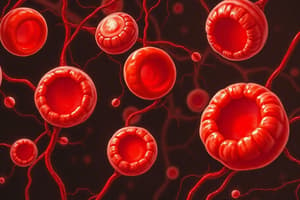Podcast
Questions and Answers
What is the primary function of platelets in the blood?
What is the primary function of platelets in the blood?
- Facilitating the immune response
- Transporting nutrients to cells
- Regulating blood temperature
- Aiding in blood clotting (correct)
Which blood component is derived from megakaryocytes?
Which blood component is derived from megakaryocytes?
- White blood cells
- Plasma
- Red blood cells
- Platelets (correct)
Who discovered the four different blood groups in humans?
Who discovered the four different blood groups in humans?
- Louis Pasteur
- Gregor Mendel
- Albert Einstein
- Karl Landsteiner (correct)
What does hemostasis refer to in the context of blood?
What does hemostasis refer to in the context of blood?
What is the primary role of the circulatory system?
What is the primary role of the circulatory system?
What are red blood cells primarily responsible for?
What are red blood cells primarily responsible for?
What gives red blood cells their red color?
What gives red blood cells their red color?
Which of the following is NOT a component of blood?
Which of the following is NOT a component of blood?
What is the primary role of the circulatory system?
What is the primary role of the circulatory system?
What is the lifespan of a red blood cell?
What is the lifespan of a red blood cell?
Which substance does the circulatory system transport away from cells for excretion?
Which substance does the circulatory system transport away from cells for excretion?
Which plasma protein helps in blood clotting?
Which plasma protein helps in blood clotting?
What function do white blood cells serve in the body?
What function do white blood cells serve in the body?
How does the circulatory system assist in protecting the body?
How does the circulatory system assist in protecting the body?
Where are white blood cells primarily produced?
Where are white blood cells primarily produced?
What physiological process is facilitated by the circulatory system in the lungs?
What physiological process is facilitated by the circulatory system in the lungs?
What role do red blood cells primarily play in the circulatory system?
What role do red blood cells primarily play in the circulatory system?
Which statement about plasma is true?
Which statement about plasma is true?
Which of the following is NOT a function of the circulatory system?
Which of the following is NOT a function of the circulatory system?
What is the function of plasma in the circulatory system?
What is the function of plasma in the circulatory system?
Which system works closely with the circulatory system to maintain homeostasis?
Which system works closely with the circulatory system to maintain homeostasis?
What is the primary function of phagocytes among white blood cells?
What is the primary function of phagocytes among white blood cells?
Which type of white blood cell is most numerous in the body?
Which type of white blood cell is most numerous in the body?
What role do eosinophils play in the immune response?
What role do eosinophils play in the immune response?
What substances do basophils release to aid in inflammatory responses?
What substances do basophils release to aid in inflammatory responses?
What is the main function of monocytes in the immune system?
What is the main function of monocytes in the immune system?
How long is the estimated normal lifespan of white blood cells?
How long is the estimated normal lifespan of white blood cells?
What do lymphocytes primarily produce in response to specific infections?
What do lymphocytes primarily produce in response to specific infections?
What is the primary function of plasma in the blood?
What is the primary function of plasma in the blood?
Study Notes
Circulatory System Overview
- The circulatory system consists of blood, blood vessels, and the heart.
- Functions include supplying tissues with oxygen and nutrients, transporting hormones, and removing waste products.
Functions of Circulatory System
- Transportation: Delivers oxygen, nutrients, and hormones; removes carbon dioxide and urea.
- Regulation: Maintains body temperature, pH levels, and fluid balance.
- Protection: Aids immune response through white blood cells and antibodies; promotes clotting to prevent blood loss.
- Exchange: Facilitates gas exchange in lungs and nutrient/waste exchange between blood and tissues.
Division of Circulatory System
- Cardiovascular System: Involves the heart and blood vessels.
- Lymphatic System: Supports immune functions and fluid balance.
Blood Composition
- Blood comprises red blood cells, white blood cells, platelets, and plasma.
Plasma
- Yellowish fluid containing proteins essential for survival, such as albumin and fibrinogen.
Red Blood Cells (RBC)
- Carry oxygen throughout the body via hemoglobin; also transport carbon dioxide.
- Lifespan of RBC is 100-120 days.
White Blood Cells (WBC)
- Help fight infections; larger and fewer than RBCs.
- Formed in bone marrow and lymph vessels with a lifespan of 13–20 days.
Types of White Blood Cells
- Neutrophils: Most numerous, destroy bacteria.
- Eosinophils: Target parasitic infections and involved in allergic reactions.
- Basophils: Release histamine in allergic responses and inflammation.
- Monocytes: Clean and digest dead cells and debris.
- Lymphocytes: Produce antibodies to combat specific infections.
Platelets
- Smallest blood cells involved in clotting and preventing bleeding.
- Formed in bone marrow and critical in hemostasis.
Blood Groups
- Discovered by Karl Landsteiner; there are four main blood groups in human populations.
Assessment Points
- Primary function of the circulatory system: Transport of nutrients, oxygen, and waste.
- Main organ pumping blood: Heart.
- Oxygen transport via: Red blood cells.
- Clotting mechanism by: Platelets.
- Fluid portion of blood: Plasma.
Studying That Suits You
Use AI to generate personalized quizzes and flashcards to suit your learning preferences.
Description
Test your understanding of the circulatory system in grade 9 science. This quiz covers the functions of the circulatory system and the roles of red blood cells, white blood cells, and plasma. Gain insights into how these components contribute to overall body health and immune defense.




